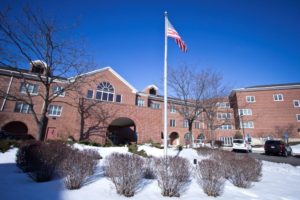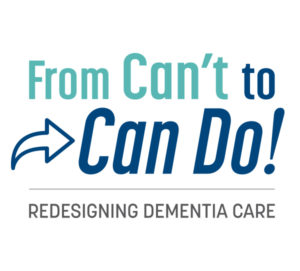Brush Development Begins 2017 with an Exciting New Montessori Program at Clark Retirement Community
Stay up to date and learn alongside Jennifer Brush and her team as they implement a model program of person-directed living
 It’s a new year, a time for new beginnings, and the perfect time to start a new project. During 2017, I’ll be working with the team at Clark Retirement Community in Grand Rapids, Michigan to implement and maintain the innovative Montessori for Aging and Dementia program. I’ll be bringing my “From Can’t to Can Do!” philosophy to a care community that already has an excellent track record for a person-directed way of life. By partnering together, we’ll create a first-rate Montessori program that will focus on enhancing the skills and abilities of individuals living with dementia in their Assisted Living community. Our goal is to create a model program – a place to train others and share ideas that will improve aged care. Throughout the year, I’ll write updates about the project and post them on my blog and in the Brush Development newsletters to keep you up to date on our progress.
It’s a new year, a time for new beginnings, and the perfect time to start a new project. During 2017, I’ll be working with the team at Clark Retirement Community in Grand Rapids, Michigan to implement and maintain the innovative Montessori for Aging and Dementia program. I’ll be bringing my “From Can’t to Can Do!” philosophy to a care community that already has an excellent track record for a person-directed way of life. By partnering together, we’ll create a first-rate Montessori program that will focus on enhancing the skills and abilities of individuals living with dementia in their Assisted Living community. Our goal is to create a model program – a place to train others and share ideas that will improve aged care. Throughout the year, I’ll write updates about the project and post them on my blog and in the Brush Development newsletters to keep you up to date on our progress.
The Montessori Philosophy
Dr. Montessori’s philosophy was to enable persons to be as independent as possible, to have a meaningful place in their community, to possess high self-esteem, and to have the chance to make meaningful contributions to their community. Montessori for Aging and Dementia is a model of care that focuses on encouraging the person in an environment that is adapted to support memory loss and independence. The result is that people living with dementia are able to make useful contributions to their community.
The process begins by learning as much as possible about the person through interviews with the individual and his or her family in order to identify an elder’s wants and needs. During this observation and interview process, care partners gather information about the person’s interests, hobbies and past and present life roles. After formal and informal assessment measures, preserved abilities are identified that will aid the person in participating in activities of choice. Cognitive, physical and sensory supports are also put into place so that this person can successfully complete preferred activities.
The Montessori for Aging and Dementia philosophy places an emphasis on the prepared environment and has established standards for care communities that want to implement this philosophy of care.
The prepared environment for elders is one that:
- Facilitates independence and exploration. The environment is filled with items that can be touched, held and used with visual, auditory and tactical supports in place such as signage, textures, color, adequate lighting, etc. to compensate for cognitive deficits.
- Allows for a great deal of activity as well as movement. Individuals are not expected to sit in one place all day. Elders choose roles that involve caring for themselves, others and for the community such as giving hand massages to people who are bed bound, sweeping the floor or passing out beverages.
- Encourages safe and frequent access to the outdoors. Opportunities for walking, contemplating, watching, exercising, socializing and gardening to name a few are made available every day.
- Offers real adult (not children's) tools and activities.
- Is uncluttered and well-maintained with an air of peace and tranquility.
- Invites the person to come in and work through the use of cues and accessible materials placed throughout the environment. Items are not locked in a cabinet for staff to get out when they think it is time.
- Has a positive atmosphere, easily seen by the attitude of those working and living there.
- Facilitates both work and play in groups and individually. Self-directed activities are accessible 24 hours of the day, seven days a week.
- Focuses on developing one’s whole personality according to one’s interests, abilities, skills and needs, allowing individuals to work on activities of their own choice at their own pace.
The Project at Clark Retirement Community
 The staff at Clark Retirement Community Assisted Living will attend the “From Can’t to Can Do!”Montessori workshop and receive follow up consulting and hands on monitoring from me each month. Chris Simons, Director of Dementia and Life Enrichment Services, and Renee Van Y, Life Enrichment Coordinator, will lead the team at Clark and mentor the staff in program implementation. In addition, I am partnering with colleagues, Dr. Natalie Douglas from Central Michigan University and Dr. Michelle Bourgeois from the University of South Florida, to conduct an evaluation of the program using both resident and staff outcome data. Both have significant research experience in the area of dementia and long-term care. They have received Institutional Review Board approval and are currently taking baseline data in the area where the project will take place, as well as in a control group care area. They will collect the same data at the end of the project and evaluate the effectiveness of the Montessori implementation by using a number of qualitative and quantitative measures.
The staff at Clark Retirement Community Assisted Living will attend the “From Can’t to Can Do!”Montessori workshop and receive follow up consulting and hands on monitoring from me each month. Chris Simons, Director of Dementia and Life Enrichment Services, and Renee Van Y, Life Enrichment Coordinator, will lead the team at Clark and mentor the staff in program implementation. In addition, I am partnering with colleagues, Dr. Natalie Douglas from Central Michigan University and Dr. Michelle Bourgeois from the University of South Florida, to conduct an evaluation of the program using both resident and staff outcome data. Both have significant research experience in the area of dementia and long-term care. They have received Institutional Review Board approval and are currently taking baseline data in the area where the project will take place, as well as in a control group care area. They will collect the same data at the end of the project and evaluate the effectiveness of the Montessori implementation by using a number of qualitative and quantitative measures.
Starting a new program always requires some degree of change. And change often makes people feel uncomfortable. Sometimes, the hardest part of change is knowing how to get started. With the intention of helping you to get started providing better dementia care, I thought I would take this opportunity to share with you our change process step by step – our successes, lessons learned, really bad decisions, etc. So, over the next twelve months, I hope you’ll join me on our journey and read about how I am supporting staff and residents to implement Montessori and turn “Can’ts” into “Can Dos!”


